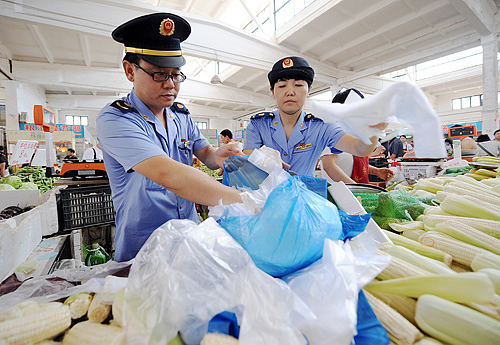|
 |
|
POLICY ENFORCEMENT: Market regulators seize ultra-thin plastic bags used illegally in a market place in Beijing on August 16, 2010 (ZHANG XU) |
In a bustling farmers' market tucked in a narrow street in Xisanqi residential community in north Beijing, stalls selling vegetables, fruits and other foods line the sidewalk.
Three years after ultra-thin plastic shopping bags were banned in China they are still available for free in this market.
In the market, a deal is usually made when a customer says, "Give me a bag," indicating he or she would like to buy the produce. Upon hearing this, the vendor will gladly snatch a plastic shopping bag from a hook.
Sixty-year-old Han Yi knows this well as she frequents the market to get most of the ingredients for meals. Han bought a chunk of bean curd, some fresh-baked pancakes, as well as cucumbers, long beans and eggplants. Each item was packed in a separate ultra-thin plastic bag.
Han knows about the ban on ultra-thin plastic shopping bags, but she said such bags were necessary. "I do not want to use so many plastic bags, but where can I put the bean curd? I cannot put pancakes together with vegetables either," she said.
The bean curd Han bought is already "swimming" in water. Producers try to wring more profit by adding more and more water to it. Water will ooze out, making bean curd difficult to carry without a plastic bag.
Nonetheless, when Han shops in a nearby Merry Mart outlet, she always brings a large vinyl bag. The supermarket charges 0.2 yuan (3 cents) for each plastic shopping bag at the checkout counter. She is a thrifty person and does not want to squander money on plastic shopping bags.
In the supermarket, Han can pack meat, bean curd and vegetables in plastic wraps, which are provided for free, before bringing them to the checkout counter.
Mixed results
Since June 1, 2008, China has banned the production, sale and use of plastic shopping bags thinner than 0.025 mm and required all retail vendors in supermarkets, department stores and other markets to charge for plastic shopping bags at least 0.025 mm thick. Before that, shopkeepers had handed out cheap, flimsy plastic shopping bags for free to customers for about 15 years.
The policy also mandates plastic shopping bag manufacturers put a barcode and their contact information on the bags for the sake of supervision.
During the past three years, the policy produced mixed results, said Li Jing, Deputy Director of the Department of Resources Conservation and Environmental Protection, the National Development and Reform Commission (NDRC).
| 